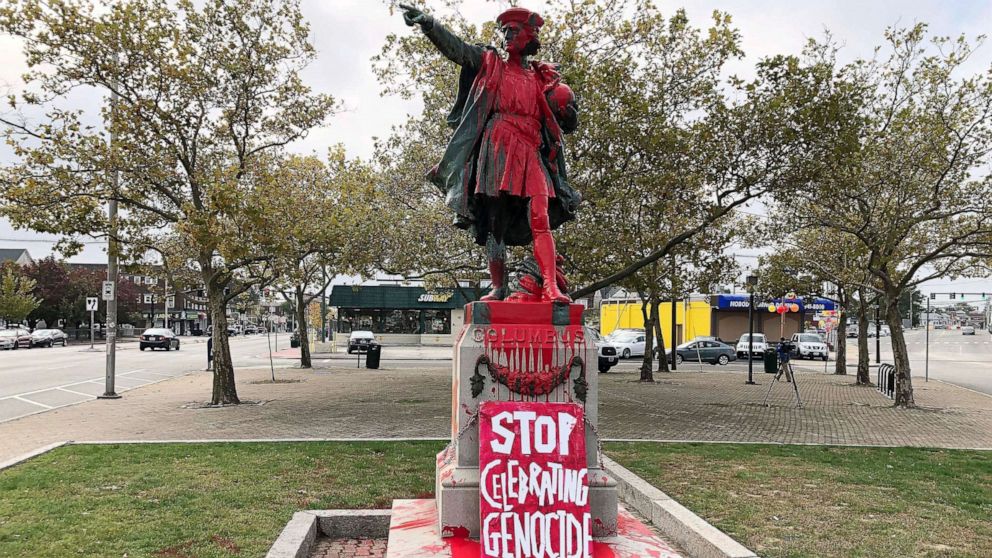
Nine years ago I was in my first year at a newly opened PBL school. My students were bused in from twenty districts across the county representing urban, suburban, and rural areas. We had a diversity of race, gender, and political views.
On Columbus Day, I decided to do a one-off lesson from the project that we were working on. So at the beginning of class I asked, “Does anyone know what day it is?”
When no one responded, I hinted, “Today is the celebration of a great man, a hero.” Finally someone unenthusiastically responded, “It’s Columbus Day.”
“That’s correct, and today we are going to learn about this great American hero.” I kept emphasizing this point while trying to keep a straight face. Meanwhile I noticed that my Hispanic students were giving me the side eye. Internally I was smiling because I knew that would change soon.
“Let’s read about Columbus from some primary and secondary source documents. We are going to read what the Catholic priest, Bartolome de las Casas, who traveled with him, wrote about Columbus and his men when he ‘discovered’ the new world.”
Without any more context I shared selections of his writings in GDocs and students read and discussed in their groups. Many of the students were surprised to hear about this side of Columbus. I remember one white, female student who came from a rural school in a segregated area, telling me in shock that she had never been taught anything about this before.
I know that many teachers now teach a realistic version of Columbus, but I want to address a few reasons why this approach to history is vitally important.
Culturally Responsive
It is crucial that our approach to teaching represents multiple viewpoints. The diversity of our society (whether or not your classroom is itself diverse) demands that all kinds of students see themselves represented in history, and not just during the months dedicated to it.
We need less mythology and more accurate telling of events.
For our students of color, they need to see how their races and ethnicities contributed to history in positive ways. They also deserve to learn about how their ancestors were systematically oppressed and held back. White students need to see the truth of how they have always had advantages in society, and the racist justifications behind it. It is not about guilt, but honesty in telling the story of our country. The teacher need not take a side or cast judgment, but is obligated to tell the entire history.
Skill building
Cultural responsive teaching is not just about studying different cultures. Using hip hop or rap to relate to students is not the only way (or perhaps even the best way) to relate to kids. Zaretta Hammond doesn’t give a checklist of “how to be culturally responsive” but emphasized that it is a mindset. A critical part of this mindset is high expectations built on trusting relationships.
But the other key aspect is teaching high level academic skills such as researching primary sources. To be culturally responsive, is to present all students with high level academic tasks that are engaging, not boring. It is also teaching students how to do them! Giving them concept maps and using thinking routines as structures to guide them in deep inquiry. Of course PBL is a great framework to implement skill building in any content area.
Critical Thinking
Notice that during this lesson, I never gave my view of Christopher Columbus. I let the sources do the talking. Most textbooks and elementary versions of Columbus whitewash him as some great man that is a myth. So I felt no need to tell that side of the story. Students were already very familiar with it. They analyzed the writing and made their own judgements about him. Students were able to interpret Columbus for themselves based on what he and his contemporaries reported.
On another note, I still was biased. I have a negative view of Columbus and that shone through in my tone, approach, and the resources that I chose. And there is nothing wrong with that! We should not treat every aspect of history as something to debate because that gives legitimacy to both sides. We don’t need to give a balanced view of slavery, imperialism, or the Holocaust because they were negative events. There is a time and place for nuanced critiques, but for many other topics there is a clear cut moral judgement.
Let’s Connect
Questions? Interested in SEL and PBL workshops or consulting on remote learning? Connect with me at michaelkaechele.com or @mikekaechele.
